After the beginning of the war in Ukraine, tens of thousands of Russians left the country fearing prosecution for their anti-war stance. Most of them settled in Georgia, Armenia, Turkey and Israel. Some are living in the Baltic states now.
Few have gone to another continent. One of the most common reasons for that, no matter how banal it may sound, is the money. Prices for plane tickets soared several times after the closure of airspace.
My husband and I left Russia on 21 March and flew to Dubai. At the airport, the customs officer rigorously counted all our cash. There was no interrogation or demand to show text messages on our phones. After that, we took five more flights and ended up on the Mexican border.
To get here people from this story (my family included) sold everything they could, from apartments and cars to shoes and guitars. All of their names have been changed, and the details of their political prosecution are not made public for security reasons.
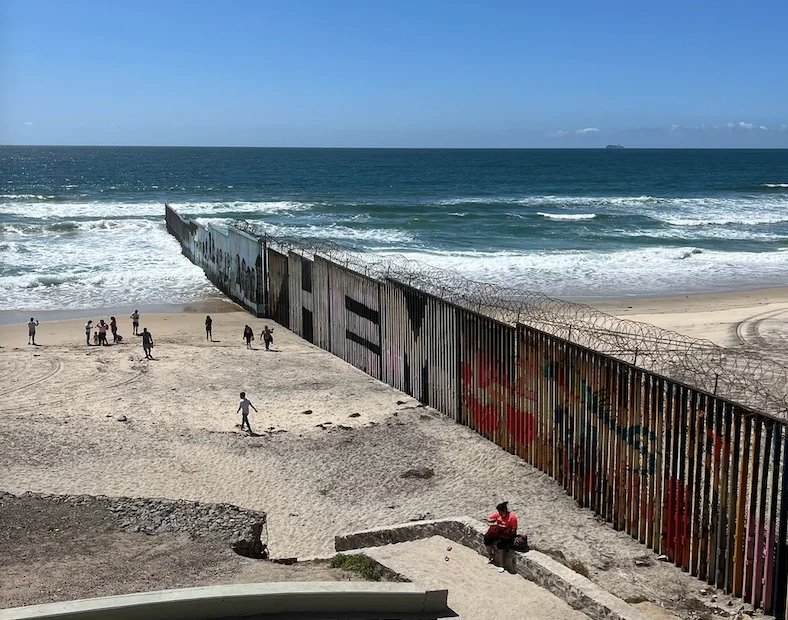
US border on Tijuana beach. Photo: Elizaveta Kirpanova / specially for Novaya Gazeta. Europe"
Tijuana
This is the most dangerous city in the world — officially.
It is located in the northwest of Mexico, right on the border with the United States. Local criminal gangs smuggle immigrants, drugs, medications, cigarettes and alcohol into California.
The population of Tijuana is more than 2.2 million people. According to statistics for 2021, 138 homicides per 100,000 residents take place here. In this city approximately six people are killed every day by gang members.
We flew to Tijuana from Mexico City. Upon arrival, the airport staff collected my and my husband’s documents for additional verification.
Almost all Russian citizens are investigated nowadays. Suspicious passengers (for example, with huge luggage or without return tickets) might easily get deported by Mexican officers.
The border guards had no questions for us though: we only had one suitcase and the return tickets were on hands. They gave us our documents back ten minutes later, and we, exhaling with relief, went through.
At the exit from the green channel stood a few young guys with blue and yellow banners. The sign said: “Допоможем безкоштовно” (“We will help for free”).
These are volunteers. They send Ukrainian refugees to a shelter near the airport, where they have the opportunity to eat and rest.
In the camp Ukrainians are registered and put in a queue. After two or three days, volunteers call and take them to the border.
Ukrainians cross it on foot, asking American officers for a “humanitarian parole” — a special permit for visa-free entry into the United States.
It allows them to stay and work in the country for a year, then it can be extended. Refugees from Russia are not given this permit.
We called a taxi from the airport and went to the hotel. We drove along the road that ran in the outskirts of Tijuana and did not notice anything dangerous. It seemed like a regular city. Destroyed roads, garbage, palm trees.
The streets looked calm and deserted.
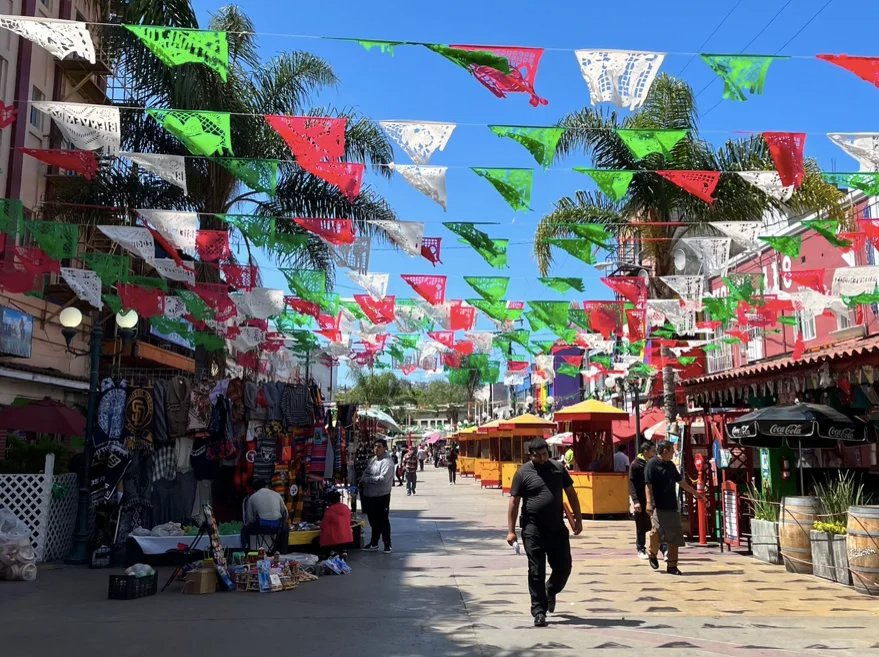
Tijuana. Photo: Elizaveta Kirpanova / specially for Novaya Gazeta. Europe"
Having settled in our room, we decided to take a walk around the city centre. The high street — Avenida Revolution — reminded me of a Russian resort. The scorching sun, souvenir shops, arrogant merchants. It smelled like fish and banana peels.
The real Tijuana opened up around the corner. By accident.
In one of the small lanes, I noticed a few sex workers in tight dresses and wearing bright make-up. They were smoking.
A little further down the road — a homeless shelter. Badly tanned, wearing hand-me-downs, these people lay still on the sidewalks. An emaciated man with greasy black hair was looking for a vein with his hands shaking. He reeked of slop.
There were lots of pharmacies. Coloured leaflets in the windows showed aphrodisiacs at a discount. They say that here, unlike in the US, people can easily buy drugs without a prescription. That is why pharmaceutical tourism is very common in Tijuana.
By lunchtime we returned to the hotel. Two Mexicans were already waiting for us there. A couple of hours before that, we had agreed to buy a used car from them. We were going to drive it to the US. But before it got dark, we decided to go to the coast.
...The waves of the Pacific Ocean are tirelessly hitting a high fence with barbed wire. It stretches along almost the entire border of California and goes right into the water. Between the iron columns of which it consists, there are small gaps. Through them, if you look closely, you can see neat white houses — the neighborhood of American San Diego.
The color of the fence is brownish-rusty. But here, at the very edge of the sandy beach, it is painted with colourful graffiti.
One of the sketches, the one closer to the water, depicts portraits of immigrants. Later I learned that their parents brought them to the US as children. And now, many years later, they face deportation to back to Mexico.
‘The project seeks to show how difficult deportation can be for those who arrived in the U.S. — sometimes as newborns — and how they must rebuild their lives in a homeland they don’t know,’ wrote The San Diego Union Tribune in July 2021, when the graffiti appeared on the fence.
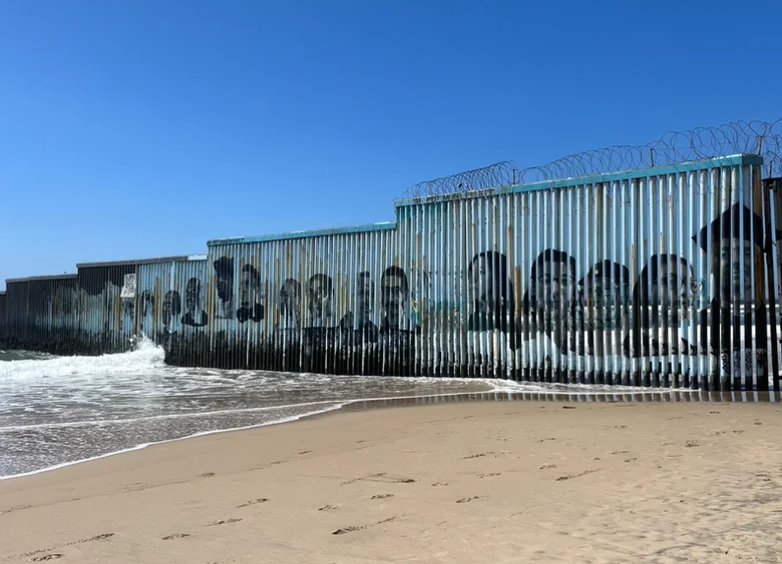
Graffiti with portraits of migrants who were threatened with deportation. Photo: Elizaveta Kirpanova / specially for Novaya Gazeta. Europe"
A few months after that, a group of 70 migrants swam across the border near this point. About 36 people — all Mexican citizens — were detained. One woman was found dead.
***
There are two border crossings in Tijuana: San Ysidro and Otay Mesa. The first is one of the busiest land border crossings in the world, the second one is quieter.
To pass through the border, you have to show the officers (both Mexican and American) a form of ID. Most often it is a driver's license. At this first stage, it is not required to show a visa (or lack of it).
If the officers turn the car back from the border (and this is pretty common with Russian documents), there is a risk of running into Mexican border guards. They often intimidate passengers with deportation, huge fines and car exemption. They say, the problem can be solved easily — with a bribe. Usually, it is about 200-300 dollars per person.
We decided to cross the border the next morning at Otay Mesa. The GPS showed us that this way was faster, but at the very entrance we ran into a huge traffic jam.
After dawn, the local citizens of Tijuana appeared on the road. Some of them pulled huge carts with snacks and souvenirs, between the car lanes. Some offered to wash the car windows. Others danced and sang in the middle of the roadway, offering hats to bored drivers for a donation.
Suddenly men in sand-colored uniforms, helmets, body armor and with guns came from both sides of the road. This, apparently, was the morning shift change at the border.
It looked scary. We were starting to get nervous.
Four hours later, we arrived at the crossing. On the ground, the border is marked with a line of yellow dots. Russian immigrants who discuss the topic of crossing the border in Telegram-chats call them “пупырки” (pupyrki).
My husband Georgii, sitting in the front seat, had showed his driver’s license in advance to an American officer, a small woman with a tight bun at the back of her head. She did not manage to see it — there was another car in front of us, and she asked to show the license again. Then she went up to our window and asked loudly:
‘Where are you from?’
My husband, confused, was silent.
‘Where are you from? Russia or Ukraine? Answer me!’ the border guard was getting angry because we were delaying traffic.
‘Russia …’ and the woman immediately ordered us to turn around for the exit.
The first attempt was failed.
***
‘Liza, did you kiss the cross?’ Georgii suddenly asked me when we, upset, came back to the hotel room to get some rest.
Before the trip to Mexico, we stayed in Armenia for a couple of weeks. We said goodbyes to our relatives, and, unusually often for us, went to church: to pray and light candles.
Just before the flight, we bought and consecrated two new wooden crosses and agreed to wear them throughout the trip. “Just in case”.
“No, I didn’t kiss it…” I answered distractedly. At that moment, my head was filled with completely different thoughts. “Should I?”
“Absolutely!”
Under my husband's gaze, I kissed the cross exactly three times, and we set off for the second run.
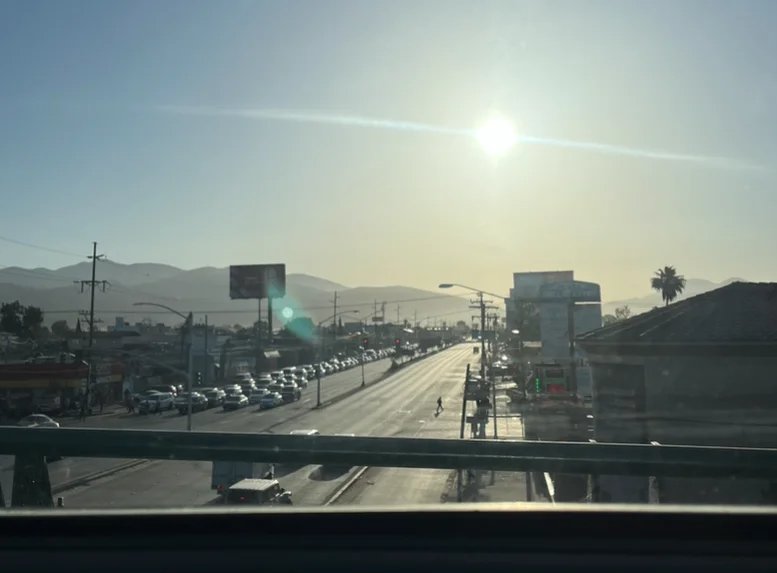
On the way to the checkpoint. Photo: Elizaveta Kirpanova / specially for Novaya Gazeta. Europe"
Closer to noon, the traffic jam moved way faster. When approached the border, Georgii showed his driver's license again. But this time the border guard took a step back and let us drive past the yellow dotted line.
We pulled up to a booth where a man in a navy-blue uniform was sitting. Three large yellow letters on his cap read CBP (Customs and Border Protection — E.K.).
“Are we in the USA?” my husband asked distinctly.
Later, he explained to me that recently he had found out from an American TV-series that if you ask an officer a direct question, he cannot lie in response.
It was very important for us to make sure that we got to the territory of the United States. If we had requested asylum from Mexican territory, we could have been deported or, even worse, put in a Mexican jail.
The border guard did not respond to Georgii's question, but did not say ‘no’ either.
“We request political asylum”, we shouted at the same time.
“Why is that?”, the officer snapped. It was obvious that he was annoyed.
“I am... I am a journalist…”, I started to explain anxiously and stumbled over every phrase.
“Congratulations! Now what?”
“I am… being persecuted by the government…”
“What government?”
“Russian…”
It seemed that after these words the officer softened. Immediately after that, he asked us to hand over our passports.
We drove to the parking lot, turned off our phones and gave them to the officer as well. Without any connection to the outside world, we would live during the whole next week.
***
Another CBP officer — tall, swarthy, with snow-white teeth — slowly walked up to us in the parking lot.
“Oh, that's so cute!” he said, seeing how I tightly hugged Georgii by the shoulders from the back seat. “Husband and wife?”
We nodded.
He politely asked us to step out of the car. We did so and raised our hands up. Apparently, this looked very stupid, because the officer began to laugh leniently.
“There’s no need”.
We pulled our things out of the trunk and said goodbye to the car in our heads. We used it for exactly 24 hours. We would never see it again. The car would remain at the border, and then, most likely, return to Tijuana.
Then we came onto the sidewalk and, following the commands of the officer, for some reason we went towards the border with Mexico. Anxious thoughts immediately appeared in my mind: “Are we going back?”
But before I panicked, we made a turn and found ourselves in front of glass doors.
Behind them was a small room. It reminded me of a police station from a typical American TV series. The officers smiled, joked, and brought each other coffee. The only thing missing was a big box of donuts.
We were asked to take off our wedding rings and remove the laces from our sneakers. The officers searched us: they checked everything, including tongue, hair, feet and crotch.
Then they took our fingerprints. When I approached, my hands were shacking treacherously, and the device could not scan the fingerprints:
“Why are you shaking”’ asked the officer who filled out my documentation.
“You have no idea what we’ve been through…”
“It’s alright”, he encouraged me. “You made it!”
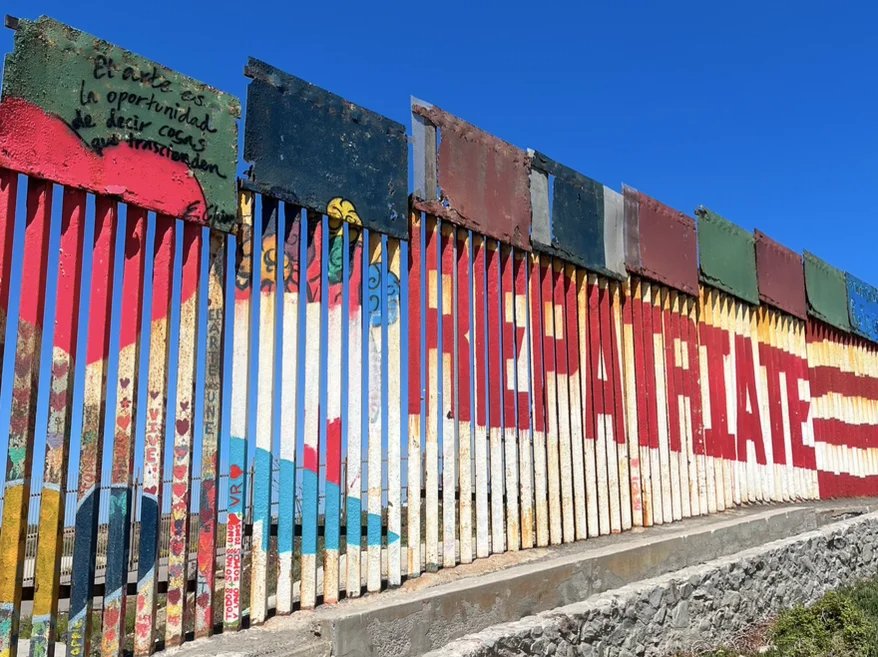
Photo: Elizaveta Kirpanova / specially for Novaya Gazeta. Europe"
After that, we went to the seats situated in front of a gray wall. There was a piece of paper with an inscription in Russian on it: ‘Do not speak’. Nearby was a bright poster about zero tolerance for sexual violence. It featured a cartoon boy and girl with stop signs covering their chest and groin. The sign said that no one has the right to touch or even look at a person's private parts without their consent.
Half an hour later, the officers put in handcuffs. This is a standard procedure: almost everyone who requests political asylum at the border faces it. But the handcuffs fell off me: my wrists were too thin.
And the officers decided to leave me without them — “there are not enough handcuffs”.
A white minibus was already waiting at the exit, and in a few minutes it brought us to…
AEU
CBP’s Admissibility Enforcement Unit (AEU) is located on the border in San Diego — at the basement of San Ysidro Port of Entry. Everyone, without exception, is sent there — men, women (including pregnant) and children (even babies) crossing the US border without permits (visas or green cards).
When we went inside, the officers took off our handcuffs and made us line up facing the information stands. They searched us again.
“Face to the wall!” strictly repeated a border guard with dark dreadlocks, wearing a bulletproof vest, when I stealthily looked at my husband standing next to me.
The officers let us take our medication out of the bags. It was checked by a local doctor after that. If they had had the generic meds in this facility, we wouldn’t have been allowed to take in the Russian ones.
The bags themselves, which had Otay Mesa identification tags on them, we carried to the storage room. We were only allowed to keep duplicate tags and cash.
Then the officers took us to the waiting room. Men and women were placed separately so that they could not communicate. My husband and I managed to silently touch hands near the water cooler, which was places in the center between our seats.
Romance of the new age.
***
And here, in front of me, is a cell of about 24 square meters. Clean white walls, gray painted floor. On the sides are narrow iron benches, but no one is sitting on them.
“Girls, take off your shoes! Don't bring in the dirt’’ a feisty girl with black eyebrows, dressed in warm pants and a vest with fur, shouted prudently.
About ten girls — all of them under the age of 30 — sat or lay top to tail on thin mats. Their faces were hidden under the benches to protect them from the bright light of the lamps. The lamps were on 24/7. The officers did not turn them off even during sleep time.
Two other newcomers — Russian Svetlana and Cuban Maria — and I clumsily made our way to the center of the cell, trying not to step on anyone. Maria was the only one among us who did not speak Russian. The rest of the girls were Russians, Belarusians and Armenians.
Before our arrival, they had been playing charades. As soon as we unpacked, the game continued, but with breaks: we could not wait to ask them about everything.
“Who has been sitting for how long?” Sveta was curious.
“Oh, I better not scare you…” dark-haired Aigul answered modestly. But then she added in a mournful voice: “14 days. Two groups of girls have already left before me”.
Aigul was a “loner”. This is what immigrants call women or men who cross the border without children.
Families with children under 21 (the full legal age in almost all US states — E. K.) are usually released from the border to freedom after a couple of days. A husband and wife who are legally married but without children are also considered “loners”. They can stay for a few days or a few weeks. It comes down to luck.
Aigul was the “oldest” out of all the detainees in our cell. The girls said that the officers “had simply forgotten about her”, “a mistake had happened”, “the human factor” took place.
“And what were you running from? What are your reasons?” Sveta continued her interrogation.
“It’s best not to ask such questions”, several girls at once cut her off and pointed to the video cameras hanging in the corners. “All our words are recorded”.
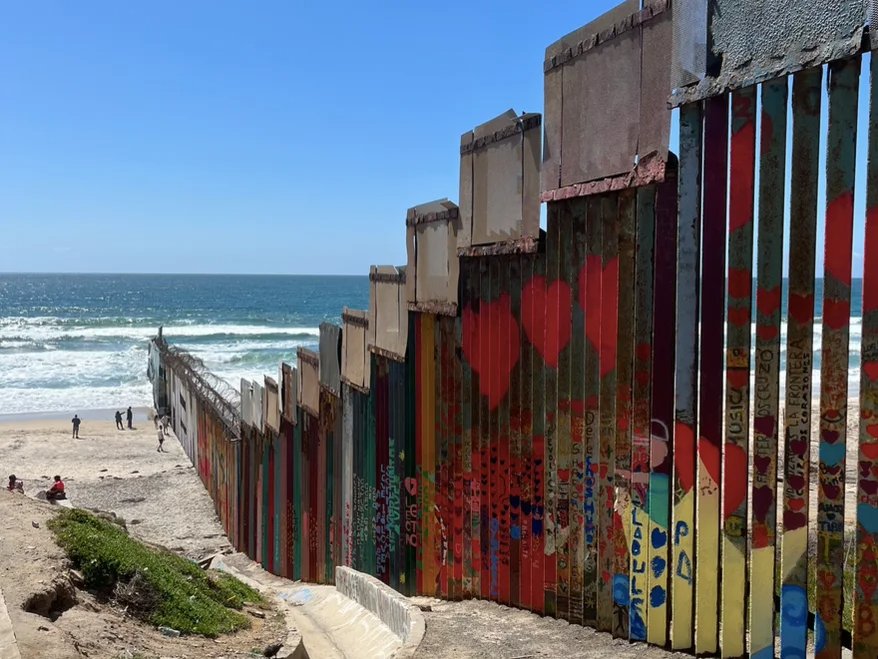
Photo: Elizaveta Kirpanova / specially for Novaya Gazeta. Europe"
After a couple of minutes of being in the cell, I felt terribly cold. An air conditioner was blowing from the ceiling next to my mat. We were not allowed to turn it off.
Girls advised to wrap myself up in a “foil blanket” (an emergency thermal blanket designed to protect against heat and cold — E. K.), which the officers gave me with words: “Try not to tear it. We won't give a second one”.
On top of the “foil blanket” I put on ordinary woolen one — a piece of luxury left from the girls who were in this cell before us.
It did feel warmer that way.
An hour later, I completely lost the sense of time. Behind the wall, children were crying hysterically: they were sitting with their mothers in the same tiny cell as us and, for sure, did not understand what was happening and why they could not go out for a walk.
Children's cries were blocked by the unbearable rustling of the foil blankets. I went to sleep, trying to imagine that it was the sound of the sea. But no matter how hard I tried, nothing worked. Bones and muscles immediately began to ache. Even my ears were swollen.
There were no pillows, and everyone got as creative as they could. Some girls put their shoes under the rug near the head. Others slept on toilet paper or wrapped unopened pads or baby diapers in foil — we could take them in the hallway when we went for dinner.
Among the “amenities” — two toilets and a sink. They were separated from the rest of the cell by a low partition. But still, everything you did, could be heard and seen.
There was also a TV, covered in protective glass. The girls said that they used to watch films, for example, the last ‘Spider-Man’. After the movie would end it would then turn on again like a loop for several times.
Sometimes there were ads for 20 seconds on the screen. It got on girls’ nerves even more. Once they could not stand it and asked the officers to turn off the TV for good.
Surprisingly, it was allowed.
***
In the AEU we ate three times a day. Twice we got rice with chicken and vegetables. It seemed to us as a paradise-like delicacy. The rest of the time the officers gave us store-bought food: tuna sandwiches, cheese and egg burgers, chips, sometimes sweets and even fruit.
The house specialty was the burrito. There were legends about it. It sounded like a simple recipe — a piece of chicken, wrapped in a tortilla along with green and black beans. But it was impossible to eat. We picked out the chicken with our hands. The rest was thrown into a large trash can.
We were usually escorted to eat. In the dining room, a small cell with iron tables, only a certain amount of people was allowed at a time. The officers always closed the door behind us, apparently in case one of us decides to run away. But on the second day during breakfast, an incident happened because of that.
I was standing in line to the water cooler when Sveta abruptly grabbed my hand and whispered in horror:
“Translate to the doctor: I think I'm having a panic attack. I'm claustrophobic…”
Sveta was a little over 40. Small, too thin, with naughty straw hair. She came from the south of Russia with her husband and two adult children. We were in the same minibus on the way from Otay Mesa to AEU. And then, together with Sveta, I went through a medical examination. She hardly spoke English, and I tried to translate her diagnosis to the doctors. I hadn’t even heard of some diseased that she was naming.
I took Sveta's arm and immediately called the doctor. He measured her pulse and blood pressure. Terrible numbers appeared on the monitor.
“You need to calm down”, he said confidently, looking straight in Sveta’s eyes. “Take a deep breath, in and out. Let's do it together: i-i-in and o-o-out.”
Sveta sat down and asked me to bring her a glass of water. I was trying to get to the cooler without waiting, but the girls did not let me skip the line.
“That woman is not feeling okay!” I was getting annoyed.
“So what? I might be feeling sick too!” someone in the crowd answered.
When I returned to Sveta, she got worse again. Her lips turned pale, her body was, she was having convulsions. She fell back, starting to lose consciousness. Seeing this, the doctor took her in his arms and ran to the medical office.
I was also shaking.
The doctor gave Sveta medicine to lower her blood pressure, but it didn't work. He called an ambulance. After a couple of minutes, a team of several people ran into the office with a stretcher in their hands. In the blink of an eye, Sveta was taken to the hospital. But by noon she was returned to the cell.
“Why so fast? Why didn't you stay longer?” other girls were surprised. After so many days in AEU, they would give anything to break free for a little while.
“They gave me an IV and I quickly got better. I was very worried about how much I would have to pay for these procedures, but now it seems like everything was free. I was detained, the responsibility for me lies with the state”, Sveta said cheerfully, as if nothing had happened. Then she added with concern: “Besides, my family stayed here. I needed to go to my family.”
***
The rest of the day felt like forever.
One of the inmates got a “forbidden” item somewhere — a plastic fork that we used as a hairbrush. This girl tightly braided everyone else's hair so that it would not get dirty so quickly. We made elastic bands from ropes torn from medical masks. (By the way, it was also forbidden to tear them).
All this reminded me of the summer months spent in children's camps. During the hated quiet time, we also liked to braid each other's hair.
One of the girls wove a purse out of foil. Men, as Georgii later told me, made checkers, backgammon and cards. Otherwise, there was nothing to do in the cell. We tried to sleep as much as possible to kill the time.
One night I was called to sign documents. I was too sleepy, and now I can hardly remember what rights the officer explained to me at that moment. Then I had to do a DNA test: rub a special stick on the inside of my cheek exactly seven times. And answer questions about diseases.
I wanted to ask the officer what I should do next and when to expect release, but I did not dare. The girls said that such questions annoy the officers.
However, there were those who tried.
“Be patient for another 1-2 days, and we will let you out”, Kimsan from Kyrgyzstan was told.
She was called not just to sign documents, but to go through a “fear interview.” During this conversation, the asylum seeker needs to convince the officer that he is afraid of persecution in the country from which they fled.
A similar interview happened with Nanuka from Georgia, who slept next to my mat. The officers told her that they would release her in a couple of days “on parole.”
Nanuka herself was sure that she would not be kept in the AEU for a long time, because she was over 55. After the interview, she dreamed about the first thing she would do when she’d be set free — “smoke a cigarette” and drink coffee with cognac. “Or without coffee at all.”
But days went by — neither Nanuku nor Kimsan, and almost no one else was being called by the officers again. At the same time, the cell was getting filled up more and more: five women from the neighboring cells were transferred to us, and there was a total of 28 women there now. Why were so many of us put in one cell? We did not ask: the officers would not answer anyway.
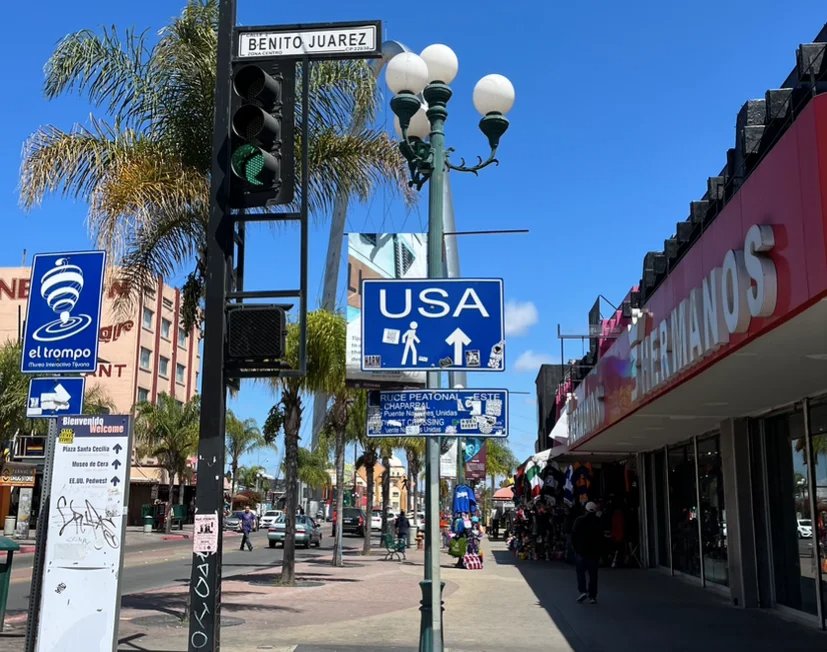
Photo: Elizaveta Kirpanova / specially for Novaya Gazeta. Europe"
The new ones were placed near the ice-cold air conditioner and toilet. There was no other free space in our cell.
On the same day, after dinner, an officer came into the cell and slowly, with difficulty pronouncing Russian and Armenian surnames, read out a list of people who would leave the AEU at the beginning of the next week.
The girls were excited. One Anya, a new inmate whose name was in the list too, wrapped her head in three foil blankets in displeasure. Her figure has become like a wigwam. Occasionally, she would open the “shutters” — make a gap near her face to tell us something. Basically, only obscenities came from there.
“Why did I listen to my relatives, for fuck’s sake? They told me: you will sit in a cell, nothing will happen to you. Yeah, right. Came to America for fucking happiness: and as a result — I’m moving from jail to jail!”
***
On the fourth day after my detention, three miracles happened at once.
First — I accidentally saw my husband in the tiny door window. He was being escorted to dinner through our wing. Our meeting lasted exactly one second.
Second — we finally took a shower. The officers gave us a paper towels, two tiny sachets of shampoo and deodorant and a stick with a piece of sponge soaked in toothpaste. The shower was locked with a timer set for exactly 10 minutes.
Thirdly — the officers released Aigul. It was the 18th day of her detention. She was accompanied by loud hoots and applause.
At night, those who were on the list also left the AEU.
When their mats were free, the redistribution of territory and ‘property’ began in the cell. Within seconds, the remaining girls took the warmest places away from the air conditioner and snatched away the woolen blankets. A few arguments took place too.
An hour later, one of the girls who had left, Veronika, returned to the cell with tearful eyes. She got nervous and fainted. She was unable to continue with the procedure. The officer said that now her name would appear last in the AEU system. This meant that Veronica had to wait for the release from the beginning.
But everything worked out. Three days later the officers came with a second list, three times bigger than the first one, and Veronica’s name was in it. Mine too. There were jokes in the cell about how embarrassing it would be to faint for the second time, and that's exactly what happened! As soon as we were all taken out into the corridor, Veronica began to slide down the wall. But this time she quickly revived herself.
About 40 women from different cells were taken to a large underground parking lot with buses and lined up around the perimeter facing the wall. Another search was going. We had to throw away hair ties.
Then the officers put handcuffs on all of us — on our hands and feet. It was hard to walk in them: the iron hooked onto my bony ankles.
As I waddled past the bus, there was a knock from the inside. I could not see anyone because the windows were tinted. But I immediately guessed that this was Georgii.
We took our seats, and all three buses took off. Nobody told us where we were going. Some girls still thought that they were going to be released soon.
Later it became clear that the bus was heading to the airport — this meant that we were being transported to a detention centre.
Some immigrants remain there until the removal hearing. Others are released on bail or sponsorship. The sponsor can be either a US citizen or a green card holder.
On the way to the airport, I got into conversation with Dasha, a smiley girl from another cell. She was one of the few who spoke good English. Her boyfriend was American. Dasha complained that when strangers found out about her relationship, they immediately thought that she wanted to marry him, because this is the easiest way to get US citizenship. But she did not. They hadn't even thought about getting married yet.
We were discussing this topic in English, so as not to bother others, when suddenly a gray-haired woman sitting in front of us got annoyed:
“Can you speak Russian? We have already heard enough of English.”
Our bus stopped right on the landing strip. While we were waiting for the plane, several girls asked to use the toilet: it was equipped right in the cabin near the back seats. The officer uncuffed a woman, a refugee from Belize, so she could do her business. The guard refused to do the same for others, advising to go to the toilet “with a partner’ who can help take off pants and underwear and then put it on back.
“It's humiliating!” someone indignantly said from behind the bus. But there was no other way.
Near the gangway, another search was arranged for us. Only after that we could come on board.
The first thing I saw when I got on the plane was my husband's red head. We sat far away from each other, and we were not allowed to talk. But no one forbade hand gestures and winks.
“I love you,” he showed me with his handcuffed hands.
On the plane they gave us food. Dasha, who was sitting next to me, tried to take a bottle of water, but because of the handcuffs, she could not bring it to her mouth. To do so you had to unnaturally arch your hands and neck. She laughed that “we looked like tyrannosauruses”.
After lunch, closer to landing, the officers uncuffed all women (but not men). From the plane we were unloaded into buses again. Men and women were separated: as it turned out later, we were being taken to different cities. The fact that we flew to Louisiana, I would find out only when we enter the detention centre.
Detention Centre
The staff of the detention centre divided us into four groups of ten people. Mine sat down to eat in the dining room. Along the way, nurses — all equally polite and smiley — measured our weight, height, blood pressure, took Covid and tuberculosis tests, and asked us to give urine — to test for drug use.
Then an employee of the centre called everyone one by one and asked us questions. Most of them concerned our mental state. For example, do we want to hurt ourselves or someone else. Have we had thoughts about death? Have we experienced sexual abuse? Is it comfortable for us to live in a cell among women? Why we were asked the last question, some Russian women stubbornly did not understand.
We were assigned an alien number and given plastic cards — our internal IDs. Before that, the staff took pictures of us in profile and in front, just like real criminals.
The “Guide for detainees” that we were given described the rules of conduct in the centre. There were punishments for misdemeanors.
The “highest” offences included murder, escape, arson, hostage-taking. As “High” were marked engaging in sexual intercourse, drinking alcohol, refusing to provide a urine sample. “High moderate” — theft, refusal to clean, gambling. For these three categories, the detainee could face the most severe punishment: a criminal case and transfer to another correctional centre.
For other violations (“low moderate”), such as faking an illness or using obscene language, you could get a reprimand, suspension from group activities or a ban from work.
Then we were given clothes. Relieved, I took off my dirty, blackened tracksuit and put on a bright pink “jail” uniform. Apart from that, the set included gray sweatpants, a sweatshirt, white t-shirts, socks, underwear, orange flip-flops and blue slip-ons.
We were also given a large mesh bag, which contained towels, a blanket, shampoo, soap, body lotion, toothpaste with a brush, a comb and a spoon.
One of the women standing in line for clothes suddenly had a fit. Dasha, who had been sitting with her in the AEU, said that she was very worried about her son: the officers refused to tell her about his fate.
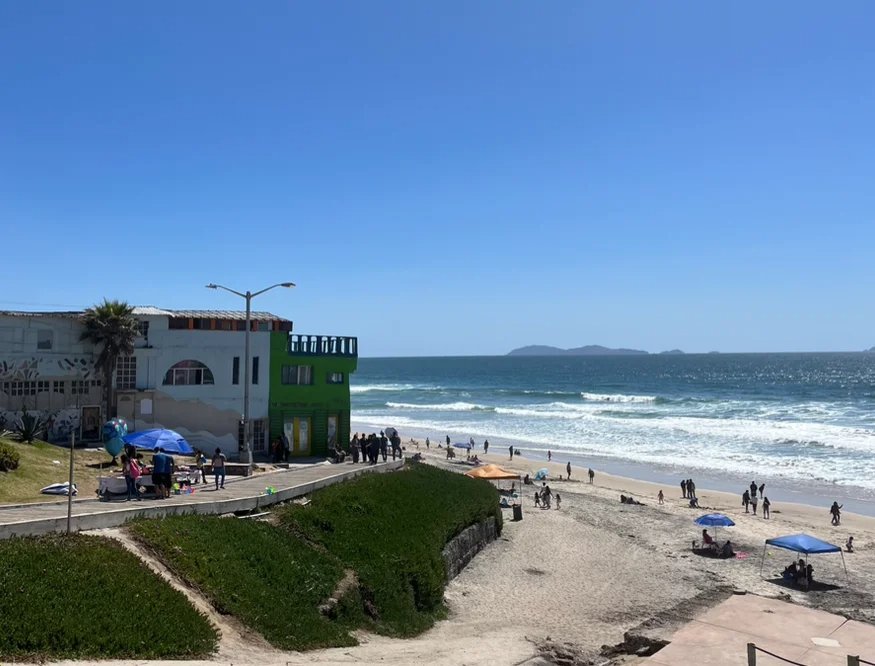
Photo: Elizaveta Kirpanova / specially for Novaya Gazeta. Europe"
At the last stage, we handed over our money to the employees of the centre. They put it on our personal deposit. After the release, the entire amount, down to a cent, was given back to us.
Our registration lasted several hours, and we were brought to the cell when the lights were already out.
The cell was something like a large hangar, which was lined with iron bunk beds. It reminded me of scenes from the “The Squid Game.”
On the side there were sinks with worn metal mirrors, behind a partition were toilets and one large shower room. It was forbidden to leave the shower in a towel or underwear: male employees could see us on the cameras.
Along the other wall were long tables, a water cooler and a separate bench where you could watch TV and even play PlayStation.
In the cell with us lived Latinos — mostly women from Venezuela, Guatemala and Honduras. Many of them had been in the centre for more than a month. As we understood, they were kept for so long because they had entered the US illegally, for example, through a hole in the border fence.
Before going to bed, Latinos stood in a circle and sang a song, holding hands. Meanwhile, we rushed to call our sponsors. My sponsor’s number was the only one I remembered by heart.
Each of us was allowed to use 500 minutes during month, but each telephone call could not be longer than 15 minutes. Then the system disconnected, but no one forbade dialing again. All calls were recorded.
It took us a while to figure out how the telephone communication was arranged in the centre: we had to enter our ID, come up with a personal pin, and wait for the connection.
A Latina girl decided to help one of my cell mates with the phone. The next day, none of them could remember the password. Officers had to reset it and reinstall it. After this incident, we were warned not to disclose our PIN to anyone. There were cases when unscrupulous cell mates, knowing the password and ID number, stole other people's minutes.
***
One of our inmates was diagnosed with Covid-19. At night, she was transferred to a solitary cell and put in quarantine. We were also isolated and restricted in our mobility.
The morning started with breakfast. Food was brought to our cell. Here at the detention centre the meals were way better than in the AEU.
The main downside was that there was no salt. We compensated for its lack with sauces. Once a week, we could order all sorts of products, including coffee, banana ice cream, peanut butter, and instant noodles. Money for the purchase was deducted from the deposit.
After breakfast was a sick call — when a nurse came into the cell and you could report about your health problems. If the illness was serious, she would take you to the doctor. The medication was given to us with care. One woman from our cell was bleeding. The doctor told her to wait a few more days. If it hadn’t ceased, only then would have they take action. After a couple of days, the bleeding, fortunately, stopped, but the medicine was never given to her.
After dinner, we were allowed to walk for one hour. From each cell there was an exit to a large green area. You could play football, volleyball and basketball. There was an arbor on the field where we could hide from the sun.
The territory was enclosed with a double fence and barbed wire. Behind it was a dense pine forest.
After the walk, a good half of the girls went for a nap. Some of them read the Bible or the New Testament. There were almost no other books in the cell.
The staff regularly counted us, even if we did not go anywhere. Several times they woke me up at night and asked me to show my ID. Following the example of Latinos, I started leaving it near the head of the bed, and no one bothered me after that.
Once a pastor came to us. He offered to pray with him for a prosperous future, family, home. But he didn't insist. The ones who did want to, stood in a semicircle. The pastor turned on the songs about God in Spanish, Russian and Armenian. Latinos sang together almost like a choir, holding plastic crosses in their hands.
We, Russians and Armenians, were mostly silent.
***
Three days passed.
On the fourth day, a detention employee came into the cell and asked who spoke English. I responded.
“Excellent! Here’s a bag for you. Pack your things, you're being transferred.”
Without understanding anything, I grabbed my things and followed her into the next, exactly the same cell. It was completely empty. When I asked what I was doing here, the employee answered:
“That cell was full.”
Half an hour later, the door opened, and another girl came in with a large bag in her hands.
“I only agreed to move because I was told that my girlfriend would be here,” Christina explained.
She and Katya flew to Louisiana on the same plane as me. In the detention centre they were divided into different groups, and they had not seen each since that moment. I asked the officer to transfer Katya to us. She promised to try, but it didn’t work out.
For the first two days, Christina and I enjoyed the silence. We watched TV — Friends, The Office, The Simpsons — right from our beds. We did puzzles.
Christina talked a lot on the phone with her brother who was also her sponsor. On the second day, she found out that she was being released at the end of the week. The ICE officer sent a message to her brother asking to buy tickets for her.
In the next cell, from which I came, apparently, girls were also starting to receive good news. Loud hooting and applause were heard from there.
I also rushed to call my sponsor, but he had not been told anything at the time. I would find out about my release on the next day.
On the same day, about 30 people were transferred to our cell. There were girls I knew from the AEU. In addition to them and the Latinos, we met women from Belize and Jamaica.
We liked Angelica from Jamaica the most, we called her Biden. She got this nickname because she constantly watched news about the American president on TV, and then she told everyone what she’s seen.
Biden was very smart.
She beat everyone at checkers. The girls who talked to her said that her children — US citizens — work in government bodies. However, this did not affect her immigration status at all.
Two Chinese women were also brought to our cell. Mimi was the funniest. Small, plump, round-faced. She constantly got into funny situations.
One day, Mimi decided to write to the ICE officer. We were allowed to send him a letter with a request. On the very first day, I asked to arrange a phone call with my husband, but I never got the answer about the decision.
Another detainee, who had arrived at the detention centre before us and had not known anything about her fate for three weeks, was told that the ICE officers would be walking around in a few days. Then there would be an opportunity to ask them all the questions. The problem was that they never entered the cell, and staff did not let us out of the cells, except to see a doctor. Quarantine.
Mimi's letter was about something completely different:
“Dear officers,” she wrote in broken English. “No Chinese people and Chinese books here. I not speak Spanish and English. Please, help me. I am so lonely. Give me Chinese books. Thank you.”
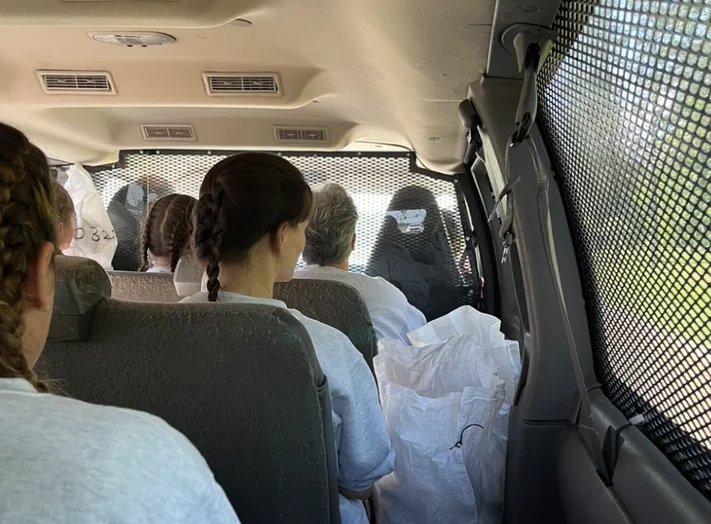
Photo: Elizaveta Kirpanova / specially for Novaya Gazeta. Europe"
***
I spent 16 days in an immigration jail.
It was the first detention in my life.
I was impossibly tired. Me and the other girls took the bus from the detention centre to the airport. From there I took a direct plane to Georgia. This state is one of the harshest in terms of granting political asylum. But this is where our sponsor and my family live.
At the Atlanta airport — one of the largest in the world — I almost got lost, and then barely found my luggage.
My father met me there. My parents fled to the US the same way as me, but a few months earlier. When I left the airport, my dad didn’t even have time to really say hello to me: because of the crazy traffic, we couldn’t stop on the road for a long time.
I started to realize what was happening only when we began to drive up to our small town. It is located near Atlanta.
And then my mother came out to see me.
My mum, whom I had not seen for six months.
She hugged me tightly, and at that moment I felt — I was at home.
Timid deer and cheeky possums often wander in our backyard. Restless squirrels jump up the trees, the air is thick and humid — and it there is a heady of the forest.
There is a long journey ahead: collection of evidence of persecution, contacting attorneys, courts, interviews with immigration officers. But I am sure everything will work out.
Because my family is by my side now.
P.S.
My husband was released from the detention center on May 18. He had spent a total of 28 days in an immigration jai.
